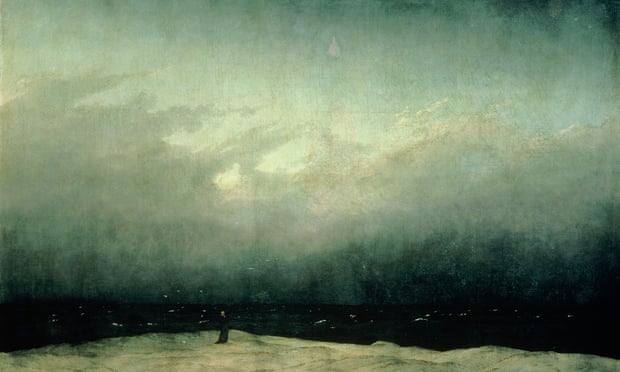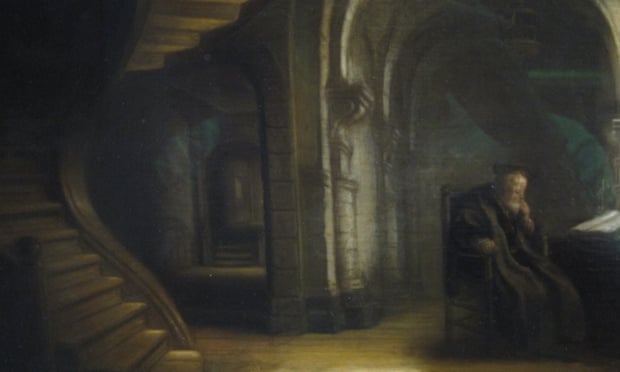The search for solitude in an internet of things
The internet is already a threat to quiet contemplation – but could the internet of things herald a return to solitude?

Solitude has long been the condition for inspiration. John the Baptist fled to the desert; Descartes retreated to his fireside; Mahler took refuge in his lakeside cabin. Through solitude, religious, intellectual or creative enlightenment can be reached. As Nietzsche said: “How can anyone become a thinker if he does not spend at least a third of the day without passions, people and books?”
Solitude involves some degree of social withdrawal, but it is not necessarily a state of loneliness. “I have never found a companion that was so companionable as solitude,” declared Thoreau; the philosopher Hans-Georg Gadamer describes it as friendship with oneself. Solitude may be enjoyed “in the midst of cities and the courts of kings”, as French philosopher Montaigne observed in the 16th century – but, he said, “it is enjoyed more handily alone”.
Solitude under threat
The internet makes physical isolation easier than ever: we can work, shop and be entertained without ever leaving our bedrooms. But withdrawing from society is a different matter. Social media is so habit-forming that Facebook has its ownaddiction scale. And as we scroll, like, click and share our way through each day’s digital maelstrom, we are left with precious little energy for creative thought. Laptops and smartphones can be turned off, at least – but what about the internet of things?
The network of networks becomes accessible through any physical object: fromcars, to umbrellas, to potted plants. But when the internet escapes from behind a screen, the world becomes a far more distracting place.
Notifications appear on our dressing tables, sofas and kitchen cabinets. The flood of emails becomes a deluge as our household appliances get in on the act. We arenudged, manipulated and spied upon in our own homes. If the internet of screens put solitude on the endangered species list, it looks like the internet of things guarantees its extinction.
Would Mahler have written two symphonies at Steinbach if his desk had a built-in touchscreen? Would Christianity have turned out differently if John the Baptist’s desert sojourn had been interrupted by recipe tips for locusts and wild honey? And what if, instead of lowering himself into his battered Queen Anne to ponder the foundations of knowledge, Descartes had relaxed into a shapeshifting smart armchair – which, upon detecting his contemplative mood, promptly transformed itself into a chaise longue?
The fear of boredom
But it’s not the internet of things that is the true threat to solitude. It’s not even the more familiar “internet of screens”. The real hazard is our own anxiety – but this trepidation is not the dread of loneliness. It’s the fear of being bored.
In a lecture course that he delivered in 1929-30, the German philosopher Martin Heidegger identified boredom as the defining mood of the 20th century. Whereas the Romantics were enraptured with the world, modern people simply shrug at it. This ubiquitous, insidious ennui plucks at our sleeves– but technology steps in, and we bury our boredom under a heap of gadgets.
In a technologically saturated world, Heidegger argues that we never truly inhabit time: we either manage it or while it away. The physical world is treated as a “standing reserve” of resources to be plundered by the onward march of innovation. The distractions of technology must be resisted, for Heidegger – but doing so requires embracing solitude, which means confronting boredom. The road is hard, but the alternative is worse. “He who completely entrenches himself against boredom also entrenches himself against himself,” warns Nietzsche: “he will never get to drink the strongest refreshing draught from his own innermost fountain.”
Solitude in the internet of things
Even though Heidegger thought that technology was fundamentally aimed at distraction and self-avoidance, it doesn’t have to be. Technology does what we design it to do. And the internet of things could help us in our search for solitude.

In the homes of the future, the mundane tasks that can interrupt concentration – regulating the heating, or taking out the bins – could be fully automated. But smarthomes are only the start. Because the internet of things could help us not just to connect more objects, but also to disconnect ourselves when we need space to think.
Studies have shown that even spotting a notification on a smartphone is distracting. So what if all home offices were equipped with physical kill-switches for notifications, which could mute all but the most urgent messages? And what if we could work not on multi-function laptops, where the temptations of the internet are just a new browser window away, but on smart typewriters with only minimal email connectivity? The homes of the future could be like the great houses of the past, run discreetly and efficiently by considerate butlers – quiet havens where the need for solitude and privacy is respected, rather than disregarded by default.
Rethinking the internet means rethinking ourselves
As the boundary between the physical and the digital grows increasingly blurred, imagining the internet of tomorrow just becomes an exercise in envisioning the future. Do we want to march onwards as mindless consumers – avaricious, fearful and jealous of our peers? Or do we want to reclaim creative space, gather our wits and face the world carefully, thoughtfully and with curiosity?
Montaigne thought that the most admirable way to live was not to seek to own more, to do more, or to be more. “The greatest thing in the world,” he wrote, “is to know how to belong to ourselves.” The internet of things doesn’t have to usher in the death of solitude. On the contrary: it could herald its return.
No comments:
Post a Comment